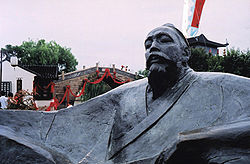- Zhang Ji (poet from Hubei)
-
This article is about Zhang Ji the Tang Dynasty poet from Hubei. For Zhang Ji the Tang Dynasty poet from Jiangnan), see Zhang Ji (poet from Jiangnan).
Zhang Ji (traditional Chinese: 張繼; simplified Chinese: 张继; pinyin: Zhāng Jì; Wade-Giles: Chang Chi, also transliterated Chang Tsi, fl. 8th century), courtesy name Yisun (懿孙), was a Chinese poet born in Xiangyang, Hubei during the Tang Dynasty.
Little is known of his life; his approximate dates are 712-715 to 779; he is known to have passed the jinshi examination in 753. He rose to be a secretary in the Board of Revenue.[1]
He is incorrectly credited under the name Chang Tsi as the author of the original Chinese text for the second movement of Das Lied von der Erde by Gustav Mahler.[2][3] The movement's title is "Der Einsame im Herbst" in German and "The Lonely Soul of Autumn" in English. The lyrics lament the dying of flowers and the passing of beauty.
The actual author of the poem used by Mahler was Qian Qi.[4]
Contents
Poetry
Zhang is correctly credited with one poem which was included in the classic anthology Three Hundred Tang Poems, which was translated by Witter Bynner as "A NIGHT-MOORING NEAR MAPLE BRIDGE", which references the famous Maple Bridge, in Suzhou, near the Hanshan Teemple and its bells.
Japanese used some of his poems for japanese typical Shigin sing poetry.
He should not be confused with Zhang Ji (poet from Jiangnan) (Chinese: 張籍), who lived until about 830.
See also
- Hanshan Temple (includes the Maple Bridge poem and related pictures)
Notes
- ^ Herbert A. Giles. "Chang Chi." A Chinese Biographical Dictionary. 1898.
- ^ Freed, Richard (2003-11-20). "About the Composition: Das Lied von der Erde". John F. Kennedy Center for the Performing Arts. http://www.kennedy-center.org/calendar/index.cfm?fuseaction=composition&composition_id=2393. Retrieved 2007-04-09.
- ^ "Teng-Leong Chew: The Identity of the Chinese Poem Mahler adapted for “Von der Jugend”". http://www.mahlerarchives.net/archives/jugendpoem.pdf. Retrieved 2007-04-09.
- ^ Quantangshi, 卷236_23 《效古秋夜長》 錢起
References
- Wang, Yunxi and Yang, Ming, "Zhang Ji". Encyclopedia of China (Chinese Literature Edition), 1st ed.
- Wenk, Arthur B. (1977-07-01). "The Composer as Poet in "Das Lied von der Erde"". 19th-Century Music 1 (1): pp. 33–47. doi:10.1525/ncm.1977.1.1.02a00030. JSTOR 746768.
- This article incorporates information from this version of the equivalent article on the Chinese Wikipedia.
External links
Categories:- Tang Dynasty poets
- Three Hundred Tang Poems poets
- Chinese poet stubs
Wikimedia Foundation. 2010.

